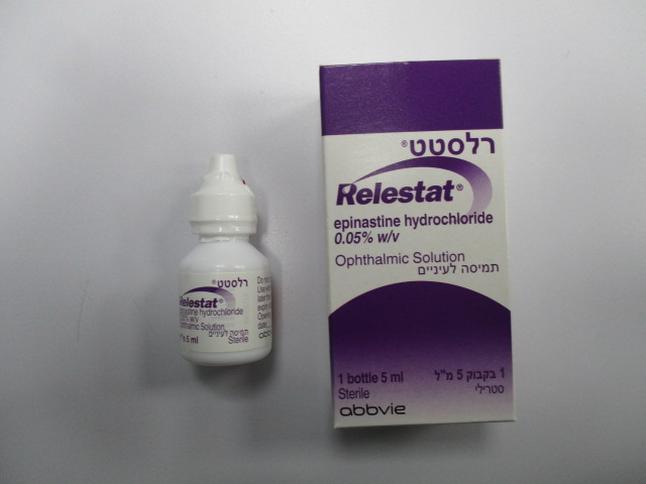Quest for the right Drug

רלסטט RELESTAT (EPINASTINE HYDROCHLORIDE)
תרופה במרשם
תרופה בסל
נרקוטיקה
ציטוטוקסיקה
צורת מתן:
עיני : OCULAR
צורת מינון:
תמיסה לעין : EYE DROPS, SOLUTION
עלון לרופא
מינוניםPosology התוויות
Indications תופעות לוואי
Adverse reactions התוויות נגד
Contraindications אינטראקציות
Interactions מינון יתר
Overdose הריון/הנקה
Pregnancy & Lactation אוכלוסיות מיוחדות
Special populations תכונות פרמקולוגיות
Pharmacological properties מידע רוקחי
Pharmaceutical particulars אזהרת שימוש
Special Warning עלון לרופא
Physicians Leaflet
Pharmacological properties : תכונות פרמקולוגיות
Pharmacodynamic Properties
5.1 Pharmacodynamic properties Pharmacotherapeutic group: Ophthalmologicals; Decongestants and Antiallergics; Other antiallergics ATC code: S01G X10 Mechanism of action Epinastine is a topically active, direct H1-receptor antagonist. Epinastine has a high binding affinity for the histamine H1-receptor and a 400 times lower affinity for the histamine H2-receptor. Epinastine also possesses affinity for the 1-, 2-, and the 5-HT2 –receptor. It has low affinity for cholinergic, dopaminergic and a variety of other receptor sites. Epinastine does not penetrate the blood/brain barrier and, therefore, does not induce side effects of the central nervous system, i.e., it is non-sedative. Pharmacodynamic effects Following topical eye application in animals, epinastine showed evidence for antihistaminic activity, a modulating effect on the accumulation of inflammatory cells, and mast cell stabilising activity. In provocation studies with allergens in humans, epinastine was able to ameliorate ocular symptoms following ocular antigen challenge. The duration of the effect was at least 8 hours. Paediatric population A 6-week, randomised, double-masked, vehicle controlled study (2:1) involving 96 ocular-wise non-symptomatic, healthy children aged 3-12 years, indicated that Relestat was well tolerated and did not identify any significant differences between the groups for any safety variable. Treatment related reactions were conjunctival follicles (6.3% in both epinastine and vehicle- treated subjects) and conjunctival hyperaemia (1.6% of epinastine treated subjects and none in the vehicle group). Safety and efficacy in patients ≥ 12 years has been established in clinical trials.
Pharmacokinetic Properties
5.2 Pharmacokinetic properties Absorption Following administration of one drop of Relestat in each eye twice daily, an average maximum plasma concentration of 0.042 ng/ml is reached after about two hours. Distribution Epinastine has a volume of distribution of 417 litres and is 64% bound to plasma proteins. Biotransformation Less than 10% is metabolised. Elimination The clearance is 928 ml/min and the terminal plasma elimination half-life is about 8 hours. Epinastine is mainly excreted renally unchanged. The renal elimination is mainly via active tubular secretion. Preclinical studies in vitro and in vivo show that epinastine binds to melanin and accumulates in the pigmented ocular tissues of rabbits and monkeys. In vitro data indicate that the binding to melanin is moderate and reversible.

שימוש לפי פנקס קופ''ח כללית 1994
לא צוין
תאריך הכללה מקורי בסל
לא צוין
הגבלות
לא צוין
מידע נוסף
